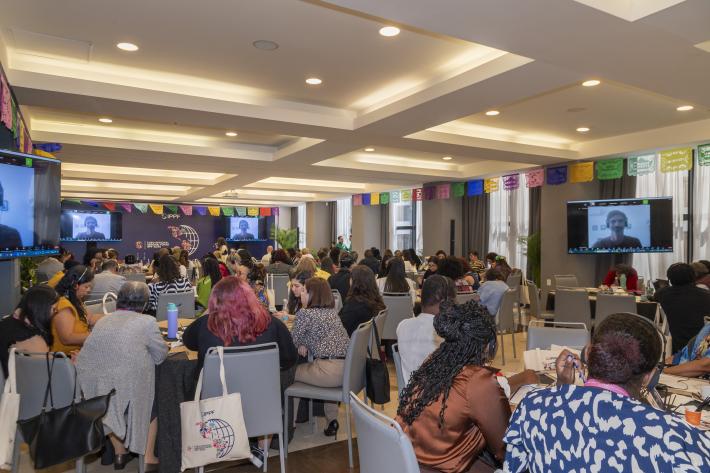Latest press releases
A selection of stories from across the Federation
Americas & the Caribbean
Breaking: IPPF Global Research Exposes Devastating Impact of the Trump Administration
Over Half of Partners and $85 Million Affected
For media enquiries


| 17 May 2024
INPPARES and IPPF's position on Peru's Supreme Decree Nº 009-2024-SA
All LGBTQI+ people in Peru and in the Americas and the Caribbean have the right to lives free from violence! In recent months, IPPF ACRO Member Associations, Collaborating Partners and the IPPF ACRO Secretariat have witnessed how some governments in the Americas and the Caribbean, even some that have historically acted to protect and advance human rights, have become the main opponents of people's rights, freedom and self-determination. So, after writing about our concerns about the new Argentinean government, today, on the International Day Against LGBTIQ+-Phobia, we want to demonstrate our strong concern with the actions of the government of Peru, which undermine the fundamental rights of LGBTIQ+ people. The IPPF Americas and Caribbean Regional Office joins INPPARES, Member Association in Peru, in expressing its rejection of the Supreme Decree Nº 009-2024-SA issued last May 10th by the Peruvian Ministry of Health which, by updating the Essential Health Insurance Plan (PEAS) based on the 10th revision of the International Classification of Diseases (ICD-10), violates the human rights of LGBTIQ+ people. Some context: The PEAS contains the list of interventions that can be addressed by health insurers in Peru, so it is vitally important that it is kept up to date with the guidelines and standards set by the World Health Organisation (WHO). From time to time, the WHO revises its International Classification of Diseases (ICD) to update it based on recent scientific evidence and thus adequately guide global clinical practice. Recall that in 2019, the 11th revision of the ICD made history by removing trans identities and expressions from the chapter on ‘Mental and Behavioural Disorders’. However, last week, the government of Peru decided to use an outdated revision of the ICD, which pathologises sexual orientation and gender identity. This decision of the Peruvian government to use ICD-10 is very serious, as it violates binding codes and agreements at local, regional and international level. On the one hand, it violates the constitutional right to health established in articles 7 and 9 of the Political Constitution of Peru, which establishes the right to health on the basis of equality and non-discrimination. Furthermore, it disregards the information, guidelines and standards of the WHO, the United Nations specialised health agency, and the requests of the Office of the UN High Commissioner since 2015 to stop the pathologisation of LGBTIQ+ people, in particular trans and intersex people. It also goes against commitments adopted by Peru in numerous regional and international declarations, such as the Montevideo Consensus, whose implementation and follow-up was officially adopted in 2016 by Supreme Decree N° 051-2016-PCM. Today, it is necessary to reaffirm that LGBTIQ+ people have the right to live free from violence, to live their gender identity and sexual orientation freely, to access health and reproductive services where their identities are respected and their specific needs are met. It is the responsibility of governments to ensure that these rights are fulfilled.

| 16 October 2023
IPPF ACRO express concern over guidance of the Zambian Ministry of Health who advised against the use of the term “sexual and reproductive health and rights”.
At a time of profound and multiple crises, it is worrying that the focus of any government's action is to go back on already consolidated international commitments, particularly those which recognize, based on evidence, that Sexual and reproductive health and rights (SRHR) are fundamental human rights, central to eradicating poverty and achieving sustainable development across its social, economic, and environmental dimensions. SRHR – which encompasses a range of issues, including universal access to SRH services and supplies, comprehensive sexuality education, and ending gender-based violence and harmful practices such as early, child and forced marriage – are fundamental to the ability of all people, especially women, adolescent girls and young people, to lead full, satisfying, healthy and productive lives. SRH services are a critical aspect of SRHR, but a complete understanding of sexual and reproductive health and rights goes far beyond on access to health facilities and services to include an array of social, legal, institutional, and financial arrangements that enable individuals to exercise their rights in general and addresses the underlying social determinants. In this regard, our Latin American community urges the government of Zambia to review its position and, on the contrary, to improve and expand the SRHR services, including increasing funding in this sector, for example by investing in fulfilling the human rights of women and girls, in all their diversity, as gender discrimination is one of the leading determinants of poor health and unwanted SRHR outcomes. It is also key to addressing inequities in access due to poverty and multiple forms of discrimination, stigma and social and economic exclusion affecting various population groups. We conclude by highlighting the importance of evidence-based policies and, in 2023, the data indicates that effective policies are not those based on stigma and discrimination or elimination of rights. On the contrary, effective policies are those that include, care for, and treat all people as subjects of rights, capable of making decisions about their health and reproductive life, with the support of a State committed to promoting citizenship and the human dignity of their people. Here, at IPPF ACRO, we will remain attentive and always willing to contribute so that rights do not go backwards and no one is left behind. In solidarity, Eugenia Lopez Uribe Regional Director for the Americas and the Caribbean

| 08 July 2022
Statement: Antigua and Barbuda to re-examine abortion laws
For immediate release: Antigua Planned Parenthood Association (APPA) / International Planned Parenthood Federation - Americas and The Caribbean Regional Office (IPPF ACRO) Statement on the government of Antigua and Barbuda re-examining abortion laws. As the government announces a re-examination of existing abortion laws in Antigua and Barbuda the Antigua Planned Parenthood Association (APPA) is pleased that policymakers have heard the call of millions of women worldwide in the wake of the detrimental ruling of Roe vs. Wade in the U.S.A. Access to abortion has been criminalized in Antigua and Barbuda since 1895, however, the government has acknowledged that the legal status has not prevented abortions with Chief of Staff in the Office of the Prime Minister, Lionel Hurst, commenting “We know that it is better to have it done by a doctor than the practice used by some of having non-professionals engaged in this system – because it can cause permanent damage”. The recognition that the current legislation has caused more harm than good, is certainly an encouraging first step toward the right to bodily autonomy for the women and girls in the country. “In our local context, the laws which criminalize abortion do not prevent the practice but certainly restrict access to safe and timely medical care. Decriminalizing abortion care would mean access to often life-saving care is a reality for women in Antigua and Barbuda.” - Lyndale Weaver-Greenaway, Executive Director at Antigua Planned Parenthood Association The mission of the Antigua Planned Parenthood Association (APPA), established in 1970, is “to advance the sexual and reproductive well-being of the Antiguan and Barbudan population by providing safe, efficient, and affordable sexual and reproductive health services including family planning” Dona Da Cosa Martinez, Deputy Regional Director of International Planned Parenthood Federation (IPPF) Americas and The Caribbean Regional Office commends the government's recognition of the need for re-examination of restrictive laws that do more harm than good for its citizens., “Antigua and Barbuda are now at the height of making the changes which are necessary to ensure the protection and fulfillment of the human rights of all its citizens to have full access to reproductive care, and in doing so, establishing a precedent for the rest of the Caribbean to follow. Now is the time for regional leaders to ensure free and full access to safe abortion care in all their countries.” The Antigua Planned Parenthood Association (APPA) is an Associate Member of the International Planned Parenthood Federation (IPPF), a movement of 120 autonomous members with a presence in over 146 countries. Member Associations provide non-profit family planning services, sexual health, and abuse prevention training and education. IPPF’s goals include giving clients the information necessary to make informed sexual health decisions, promoting continuous sexual health, and making high-quality sexual health services available.
















